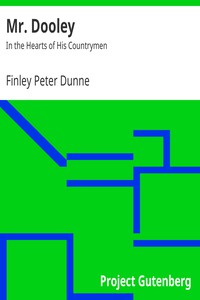Mr. Dooley: In the Hearts of His Countrymen by Finley Peter Dunne (online e book reading txt) 📖

- Author: Finley Peter Dunne
Book online «Mr. Dooley: In the Hearts of His Countrymen by Finley Peter Dunne (online e book reading txt) 📖». Author Finley Peter Dunne
 Boston
BostonSmall, Maynard & Company 1899
Copyright, 1898, 1899, by the Chicago Journal
Copyright, 1899, by Robert Howard Russell
Copyright, 1899, by Small, Maynard & Company
Entered at Stationers' Hall
First Edition (10,000 copies) October, 1899
Second Edition (10,000 copies) October, 1899
Third Edition (10,000 copies) October, 1899
Before Publication
Press of George H. Ellis, Boston, U.S.A.
TO
SIR GEORGE NEWNES, BART.
MESSRS. GEORGE ROUTLEDGE & SONS LIMITED
AND OTHER PUBLISHERS WHO, UNINVITED, PRESENTED
MR. DOOLEY TO A PART OF THE BRITISH PUBLIC
The author may excuse the presentation of these sketches to the public on the ground that, if he did not publish some of them, somebody would, and, if he did not publish the others, nobody would. He has taken the liberty to dedicate the book to certain enterprising gentlemen in London who have displayed their devotion to a sentiment now widely prevailing in the Music Halls by republishing an American book without solicitation on the author's part. At the same time he begs to reserve in petto a second dedication to the people of Archey Road, whose secluded gayety he has attempted to discover to the world.
With the sketches that come properly under the title "Mr. Dooley: In the Hearts of His Countrymen" are printed a number that do not. It has seemed impossible to a man who is not a Frenchman, and who is, therefore, tremendously excited over the case, to avoid discussion of the Jabberwocky of the Rennes court-martial as it is reported in America and England. Mr. Dooley cannot lag behind his fellow Anglo-Saxons in this matter. It is sincerely to be hoped that his small contribution to the literature of the subject will at last open the eyes of France to the necessity of conducting her trials, parliamentary sessions, revolutions, and other debates in a language more generally understood in New York and London.
F.P.D.
DUBLIN, August 30, 1899.
Mr. DOOLEY:
In the Hearts of His Countrymen
EXPANSION.
"Whin we plant what Hogan calls th' starry banner iv Freedom in th' Ph'lippeens," said Mr. Dooley, "an' give th' sacred blessin' iv liberty to the poor, down-trodden people iv thim unfortunate isles,—dam thim!—we'll larn thim a lesson."
"Sure," said Mr. Hennessy, sadly, "we have a thing or two to larn oursilves."
"But it isn't f'r thim to larn us," said Mr. Dooley. "'Tis not f'r thim wretched an' degraded crathers, without a mind or a shirt iv their own, f'r to give lessons in politeness an' liberty to a nation that mannyfacthers more dhressed beef than anny other imperyal nation in th' wurruld. We say to thim: 'Naygurs,' we say, 'poor, dissolute, uncovered wretches,' says we, 'whin th' crool hand iv Spain forged man'cles f'r ye'er limbs, as Hogan says, who was it crossed th' say an' sthruck off th' comealongs? We did,—by dad, we did. An' now, ye mis'rable, childish-minded apes, we propose f'r to larn ye th' uses iv liberty. In ivry city in this unfair land we will erect school-houses an' packin' houses an' houses iv correction; an' we'll larn ye our language, because 'tis aisier to larn ye ours than to larn oursilves yours. An' we'll give ye clothes, if ye pay f'r thim; an', if ye don't, ye can go without. An', whin ye're hungry, ye can go to th' morgue—we mane th' resth'rant—an' ate a good square meal iv ar-rmy beef. An' we'll sind th' gr-reat Gin'ral Eagan over f'r to larn ye etiquette, an' Andhrew Carnegie to larn ye pathriteism with blow-holes into it, an' Gin'ral Alger to larn ye to hould onto a job; an', whin ye've become edycated an' have all th' blessin's iv civilization that we don't want, that 'll count ye one. We can't give ye anny votes, because we haven't more thin enough to go round now; but we'll threat ye th' way a father shud threat his childher if we have to break ivry bone in ye'er bodies. So come to our ar-rms,' says we.
"But, glory be, 'tis more like a rasslin' match than a father's embrace. Up gets this little monkey iv an' Aggynaldoo, an' says he, 'Not for us,' he says. 'We thank ye kindly; but we believe,' he says, 'in pathronizin' home industhries,' he says. 'An,' he says, 'I have on hand,' he says, 'an' f'r sale,' he says, 'a very superyor brand iv home-made liberty, like ye'er mother used to make,' he says. ''Tis a long way fr'm ye'er plant to here,' he says, 'an' be th' time a cargo iv liberty,' he says, 'got out here an' was handled be th' middlemen,' he says, 'it might spoil,' he says. 'We don't want anny col' storage or embalmed liberty,' he says. 'What we want an' what th' ol' reliable house iv Aggynaldoo,' he says, 'supplies to th' thrade,' he says, 'is fr-esh liberty r-right off th' far-rm,' he says. 'I can't do annything with ye'er proposition,' he says. 'I can't give up,' he says, 'th' rights f'r which f'r five years I've fought an' bled ivry wan I cud reach,' he says. 'Onless,' he says, 'ye'd feel like buyin' out th' whole business,' he says. 'I'm a pathrite,' he says; 'but I'm no bigot,' he says.
"An' there it stands, Hinnissy, with th' indulgent parent kneelin' on th' stomach iv his adopted child, while a dillygation fr'm Boston bastes him with an umbrella. There it stands, an' how will it come out I dinnaw. I'm not much iv an expansionist mesilf. F'r th' las' tin years I've been thryin' to decide whether 'twud be good policy an' thrue to me thraditions to make this here bar two or three feet longer, an' manny's th' night I've laid awake tryin' to puzzle it out. But I don't know what to do with th' Ph'lippeens anny more thin I did las' summer, befure I heerd tell iv thim. We can't give thim to anny wan without makin' th' wan that gets thim feel th' way Doherty felt to Clancy whin Clancy med a frindly call an' give Doherty's childher th' measles. We can't sell thim, we can't ate thim, an' we can't throw thim into th' alley whin no wan is lookin'. An' 'twud be a disgrace f'r to lave befure we've pounded these frindless an' ongrateful people into insinsibility. So I suppose, Hinnissy, we'll have to stay an' do th' best we can, an' lave Andhrew Carnegie secede fr'm th' Union. They'se wan consolation; an' that is, if th' American people can govern thimsilves, they can govern annything that walks."
"An' what 'd ye do with Aggy—what-d'ye-call-him?" asked Mr. Hennessy.
"Well," Mr. Dooley replied, with brightening eyes, "I know what they'd do with him in this ward. They'd give that pathrite what he asks, an' thin they'd throw him down an' take it away fr'm him."
A HERO WHO WORKED OVERTIME.
"Well, sir," said Mr. Dooley, "it looks now as if they was nawthin' left f'r me young frind Aggynaldoo to do but time. Like as not a year fr'm now he'll be in jail, like Napoleon, th' impror iv th' Fr-rinch, was in his day, an' Mike, th' Burglar, an' other pathrites. That's what comes iv bein' a pathrite too long. 'Tis a good job, whin they'se nawthin' else to do; but 'tis not th' thing to wurruk overtime at. 'Tis a sort iv out-iv-dure spoort that ye shud engage in durin' th' summer vacation; but, whin a man carries it on durin' business hours, people begin to get down on him, an' afther a while they're ready to hang him to get him out iv th' way. As Hogan says, 'Th' las' thing that happens to a pathrite he's a scoundhrel.'
"Las' summer there wasn't a warmer pathrite annywhere in our imperyal dominions thin this same Aggynaldoo. I was with him mesilf. Says I: 'They'se a good coon,' I says. 'He'll help us f'r to make th' Ph'lippeens indepindint on us f'r support,' I says; 'an', whin th' blessin's iv civilization has been extinded to his beloved counthry, an',' I says, 'they put up intarnal rivinue offices an' post-offices,' I says, 'we'll give him a good job as a letter-carrier,' I says, 'where he won't have annything to do,' I says, 'but walk,' I says.
"An' so th' consul at Ding Dong, th' man that r-runs that end iv th' war, he says to Aggynaldoo: 'Go,' he says, 'where glory waits ye,' he says. 'Go an' sthrike a blow,' he says, 'f'r ye'er counthry,' he says. 'Go,' he says. 'I'll stay, but you go,' he says. 'They's nawthin' in stayin', an' ye might get hold iv a tyrannical watch or a pocket book down beyant,' he says. An' off wint th' brave pathrite to do his jooty. He done it, too. Whin Cousin George was pastin' th' former hated Castiles, who was it stood on th' shore shootin' his bow-an-arrow into th' sky but Aggynaldoo? Whin me frind Gin'ral Merritt was ladin' a gallant charge again blank catredges, who was it ranged his noble ar-rmy iv pathrites behind him f'r to see that no wan attackted him fr'm th' sea but Aggynaldoo? He was a good man thin,—a good noisy man.
"Th' throuble was he didn't know whin to knock off. He didn't hear th' wurruk bell callin' him to come in fr'm playin' ball an' get down to business. Says me Cousin George: "Aggynaldoo, me buck,' he says, 'th' war is over,' he says, 'an' we've settled down to th' ol' game,' he says. 'They're no more heroes. All iv thim has gone to wurruk f'r th' magazines. They're no more pathrites,' he says. 'They've got jobs as gov'nors or ar-re lookin' f'r thim or annything else,' he says. 'All th' prom'nint saviors iv their counthry,' he says, 'but mesilf,' he says, 'is busy preparin' their definse,' he says. 'I have no definse,' he says; 'but I'm where they can't reach me,' he says. 'Th' spoort is all out iv th' job; an', if ye don't come in an' jine th' tilin masses iv wage-wurrukers,' he says, 'ye won't even have th' credit iv bein' licked in a gloryous victhry,' he says. 'So to th' woodpile with ye!' he says; 'f'r ye can't go on cillybratin' th' Foorth iv July without bein' took up f'r disordherly conduct,' he says.
"An' Aggynaldoo doesn't undherstand it. An' he gathers his Archery Club ar-round him, an' says he: 'Fellow-pathrites,' he says, 'we've been betrayed,' he says. 'We've been sold out without,' he says, 'gettin' th' usual commission,' he says. 'We're still heroes,' he says; 'an' our pitchers is in th' pa-apers,' he says. 'Go in,' he says, 'an' sthrike a blow at th' gay deceivers,' he says. 'I'll sell ye'er lives dearly,' he says. An' th' Archery Club wint in. Th' pathrites wint up again a band iv Kansas sojers, that was wanst heroes befure they larned th' hay-foot-sthraw-foot, an' is now arnin' th' wages iv a good harvest hand all th' year ar-round, an' 'd rather fight than ate th' ar-rmy beef, an' ye know what happened. Some iv th' poor divvles iv heroes is liberated fr'm th' cares iv life; an' th' r-rest iv thim is up in threes, an' wishin' they was home, smokin' a good see-gar with mother.
"An' all this because Aggynaldoo didn't hear th' whistle blow. He thought th' boom was still on in th' hero business. If he'd come in, ye'd be hearin' that James Haitch Aggynaldoo 'd been appointed foorth-class





Comments (0)